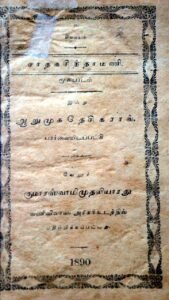Read in : தமிழ்
Two years ago, A Saravanakumar from Madurai had to take a tough call as a bibliophile. His love of books was so much that his natural inclination was to collect, not sell. But he needed money to fund his son’s medicine studies and so decided to sell his collection of 4,000 rare books. And, it opened a new world to him.
Having made Rs 3 lakh from his first venture into e-sales of rare books, Saravanan has become a full time bookseller. He has built a clientele of 1000 people, mostly research scholars, professors, and heads of departments. The research scholars are from across the world. Many are from the Tamil diaspora living in countries like Malaysia, Singapore, Canada and the United Kingdom. They all want rare books which are not available online and are not in print anymore.

Saravanakumar with some of the rare books
Most of the transactions are done online. Saravanan runs this business through chat applications like WhatsApp and Telegram. He posts a list of 50 available books over online groups every day. The members start calling him. They place orders. He charges book price and courier charges. Once the rates are finalized, the books are sent via India Post or DHL. “The choice of the courier agency is left to the client. DHL is costly but the consignment will reach soon. India Post takes time but is affordable,” he says.
He has built a clientele of 1000 people, mostly research scholars, professors, and heads of departments. The research scholars are from across the world. Many are from the Tamil diaspora living in countries like Malaysia, Singapore, Canada and the United Kingdom.

First President Rajendra Prasad’s book on partition
Saravanakumar’s sample catalogue includes a collection of the issues of the magazine, Tamil Talkies, published by theatre doyen Pammal Sambandha Mudaliyar in the 1930s. The first President of India, Rajendra Prasad’s book about the possible backlash of partition two years ahead of Indian independence is part of his collection. Prasad’s book published in 1945 was translated into Tamil and was published in May 1947, months ahead of partition.
The United States Embassy in India had published a book in the 1960s about life in America with pictures. The book printed in Tamil gives an experience of traveling in a time machine. “These books are not in print anymore. We can’t find them unless we are extremely lucky,” Saravanan says.
For research scholars, especially the ones researching Tamil literature, Saravanakumar’s books are a treasure trove. Sanga Ilakkiaya Urai (interpretation) books published circa 1950 are in great demand among PhD scholars.
Sometimes, customers ask Saravanakumar to procure them books. “Such books are hard to find now. I do ask them for time because it takes months to find such books. But the search is futile most of the time,” he said.
His decade-long experience as a librarian and his graduation in Tamil helps him to look in the right places. He has connections with 150 old book vendors in south Tamil Nadu.

It took seven years for Saravanakumar to find this rare book published in 1890
His decade-long experience as a librarian and his graduation in Tamil helps him to look in the right places. He has connections with 150 old book vendors in south Tamil Nadu. He goes to them looking for books. When he stumbles upon rare books, he buys them. They usually charge half the rate of the book price or 50 paise per page. “I keep a margin of 10% on the price quoted by the vendors. More than the price, these books reach the people who know the value of them,” he stated.
Saravanakumar talks about how these books end up in old book stores. Bibliophiles spend their time and money buying such books during their lifetime. When a book collector passes away, the next generation may not know the value of such books. They simply discard them at a throwaway price. Thousands of rare books are discarded in this manner. Some are preserved but most of them end up as paper pulp.
The old books are difficult to handle and crumble when touched. Some are moth-eaten. “In my experience, these crumbling moth-eaten books are the ones in great demand. As a bibliophile myself, I am glad that I am able to connect these books with people who need them most,” he added.
Read in : தமிழ்











